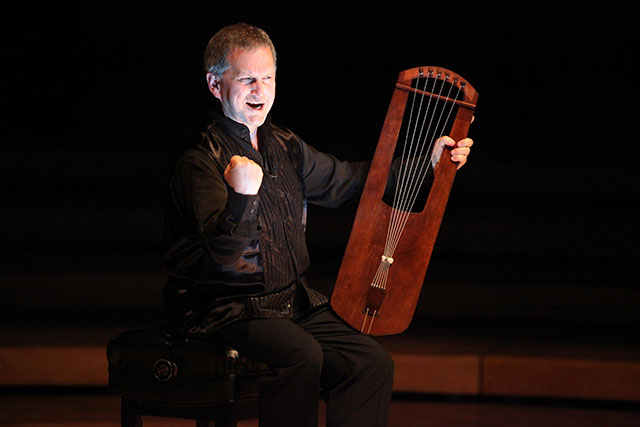Narrating the The Inquisitor’s Tale:
How My One ‘Crazy Idea’ Led to an Amazing Audiobook Experience
by Adam Gidwitz
A version of this article originally appeared on Listening Library and was reprinted with permission.
As I was coming into the homestretch of composing my novel, The Inquisitor’s Tale, my wife took me to a concert. She and I have slightly different taste in concerts. I like concerts where I can sing at the top of my lungs and dance around like an idiot. This was not that kind of concert.
The performer was Benjamin Bagby, one of the leading scholars and performers of early Western music in the world today. Bagby’s most celebrated works are his ongoing performances of Beowulf, which he performs in the Anglo-Saxon, with super-titles, accompanied by historically accurate music that he has reconstructed from historical sources. We were seeing a performance called “Frankish Phantoms: Echoes from the Carolingian Palaces” (8th – 10th centuries), by Bagby and his group Sequentia. I was pretty sure I wouldn’t be able to sing along.
Nor would I have wanted to. Sequentia plays beautifully, and Bagby’s round, haunting basso froze me in my seat. I was transfixed. Midway through the concert, they performed “The Song of Hildebrand,” about an old warrior, long presumed dead, meeting his son on the battlefield. The son refuses to believe that his opponent is his father, and, because the song is a fragment of a longer piece, it ends with the two colliding in battle — we don’t know who lives, and who dies. It is amazing.

As I said, I was writing the last few chapters of my book The Inquisitor’s Tale, which takes place in France in the 13th century. It is the story of three children — a peasant girl named Jeanne, a Jewish boy named Jacob, and a young monk-in-training of African descent named William — encountering persecution and intolerance. It is also an epic adventure. Near the end of the novel, in one of my favorite scenes, the children find themselves in a tavern. A troubadour approaches them. And, thanks to my wife and her crazy taste in concerts — and also to Benjamin Bagby and Sequentia — they hear a troubadour sing “The Song of Hildebrand.”
Once the book was finished, we began work on the audiobook. I begged to narrate it. I have always considered myself a storyteller — I got into writing because I was a teacher who spent most of the day telling stories to his first and second graders. So ultimately, I was allowed to be one of the nine narrators of The Inquisitor’s Tale. I was thrilled beyond belief. Until, that is, I had to do the recording. I sat in the booth, eager to begin. I began. And then was told to stop. I had spit in my mouth, and they could hear it on the recording. No problem. I took a sip of water, and began again. Stop! My throat was gurgling. Okay. Stop! Please enunciate more carefully! After each of the first four chapters, the director said to me, “You’re gonna get the hang of this real soon!” All I could think was what a huge mistake I’d made, asking to narrate. I’ve ruined the recording, I thought. Is there any way to get out of this? And I was getting tired. Sitting perfectly straight, not gurgling, breathing at the right times, enunciating every single word — and performing. I perform usually with my whole body, with my eyes, with asides and explanations. But here, everything had to be through my voice.
After the fifth chapter, the director said, “Nice! We can use that! Keep going!” And then, “Good! Now you’re getting it!” By the end of the first day of recording, I was so exhausted that I had become punch drunk. I couldn’t get through a sentence without laughing hysterically.
They sent me home.
The second day was better. We rerecorded the first four chapters. I was on a roll. It was getting kinda fun. We finished early, and I felt like I had done something monumental.
Listen to a sample of the audiobook.
And then, the producer asked me what we were going to do about “The Song of Hildebrand.” Did I want any music? Anything to make it sound more like a song?
And I got a crazy idea. I asked my wife. She told me there was no way. I asked the folks at Listening Library. They were supportive, but skeptical that it would work out.
I did it anyway.
I wrote to one the most important scholars and performers of Western early music in the world, and I asked him if he would record “The Song of Hildebrand” for the audiobook. I sent him the chapter in the tavern, too, so he could see the context.
Benjamin Bagby wrote back. He said yes. He added, “The selection from your novel which you sent is fascinating, and I admire the way you have created a new access to this text, and to another way of thinking about storytelling.”
I couldn’t believe it.
“The Song of Hildebrand” has, to the best of my knowledge, never been recorded. Bagby himself reconstructed the music according to his historical method. The first time a recording of it has ever been available is on the audiobook of The Inquisitor’s Tale.
I can’t tell you how proud that makes me.
Also, you should hear the recording. It is amazing.
Adam Gidwitz and Benjamin Bagby will appear together for the first time at Symphony Space in New York City on Saturday, April 1, 2017, for an interactive storytelling event bringing the Middle Ages to life for young readers and listeners (costumes encouraged!). Find more details and tickets here.
